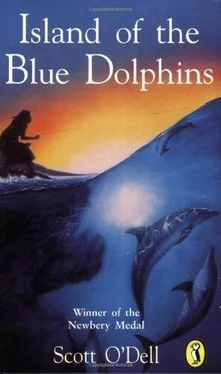Scott O'Dell - Island of the Blue Dolphins
Здесь есть возможность читать онлайн «Scott O'Dell - Island of the Blue Dolphins» весь текст электронной книги совершенно бесплатно (целиком полную версию без сокращений). В некоторых случаях можно слушать аудио, скачать через торрент в формате fb2 и присутствует краткое содержание. Год выпуска: 1966, ISBN: 1966, Издательство: PUFFIN BOOKS, Жанр: Детские приключения, на английском языке. Описание произведения, (предисловие) а так же отзывы посетителей доступны на портале библиотеки ЛибКат.
- Название:Island of the Blue Dolphins
- Автор:
- Издательство:PUFFIN BOOKS
- Жанр:
- Год:1966
- ISBN:978-0-14-192524-0
- Рейтинг книги:3 / 5. Голосов: 1
-
Избранное:Добавить в избранное
- Отзывы:
-
Ваша оценка:
- 60
- 1
- 2
- 3
- 4
- 5
Island of the Blue Dolphins: краткое содержание, описание и аннотация
Предлагаем к чтению аннотацию, описание, краткое содержание или предисловие (зависит от того, что написал сам автор книги «Island of the Blue Dolphins»). Если вы не нашли необходимую информацию о книге — напишите в комментариях, мы постараемся отыскать её.
Island of the Blue Dolphins won the Newbery Medal in 1961. It was adapted into a film of the same name in 1964. O'Dell later wrote a sequel, Zia, published in 1976.
Island of the Blue Dolphins — читать онлайн бесплатно полную книгу (весь текст) целиком
Ниже представлен текст книги, разбитый по страницам. Система сохранения места последней прочитанной страницы, позволяет с удобством читать онлайн бесплатно книгу «Island of the Blue Dolphins», без необходимости каждый раз заново искать на чём Вы остановились. Поставьте закладку, и сможете в любой момент перейти на страницу, на которой закончили чтение.
Интервал:
Закладка:
It was a hard task catching fish every day, especially if the wind was blowing and the waves were high. Once when I could catch only two and dropped them into the pool, Mon-a-nee ate them quickly and waited for more. When he found that was all I had he swam around in circles, looking at me reproachfully.
The waves were so high the next day that I could not fish on the reef even at low tide, and since I had nothing to give him I did not go to the pool.
It was three days before I could catch fish and when I went there again the pool was deserted. I knew that he would leave someday, but I felt bad that he had gone back to the sea and that I would never catch fish for him again. Nor would I know him if I saw him again in the kelp, for now that he had grown and his wound had healed, he looked like all the others.
Soon after the Aleuts had left I moved back to the headland.
Nothing had been harmed except the fence, which I mended, and in a few days the house was the same as before. The only thing that worried me was that all the abalones I had gathered in the summer were gone. I would need to live from day to day on what I could catch, trying to get enough on the days when I could fish to last through the times when I could not. Through the first part of the winter, before Mon-a-nee swam away, this was sometimes hard to do. Afterwards it was not so hard and Rontu and I always had enough to eat.
While the Aleuts were on the island, I had no chance to catch little smelts and dry them, so the nights that winter were dark and I went to bed early and worked only during the day. But still I made another string for my fishing spear, many hooks of abalone shell, and last of all ear-rings to match the necklace Tutok had given me.
These took a long time, for I searched the beach many mornings when the tide was out before I found two pebbles of the same colour as the stones in the necklace and soft enough to cut. The holes in the ear-rings took even more time, for the stones were hard to hold, but when I was done and had rubbed them bright in fine sand and water, and fastened them with bone hooks to fit my ears, they were very pretty.
On sunny days I would wear them with my cormorant dress and the necklace, and walk along the cliff with Rontu.
I often thought of Tutok, but on these days especially I would look off into the north and wish that she were here to see me. I could hear her talking in her strange language and I would make up things to say to her and things for her to say to me.
24
Spring again was a time of flowers and water ran in the ravines and flowed down to the sea. Many birds came back to the island.
Tainor and Lurai built a nest in the tree where they were born. They built it of dry seaweed and leaves and also with hairs off Rontu's back. Whenever he was in the yard while it was being made, they would swoop down if he were not looking and snatch a beakful of fur and fly away. This he did not like and he finally hid from them until the nest was finished.
I had been right in giving a girl's name to Lurai, for she laid speckled eggs and, with some help from her mate, hatched two ugly fledglings which soon became beautiful. I made up names for them and clipped their wings and before long they were as tame as their parents.
I also found a young gull that had fallen from its nest to the beach below. Gulls make their nests high on the cliffs, in hollow places on the rocks. These places are usually small and often I had watched a young one teetering on the edge of the nest and wondered why it did not fall. They seldom did.
This one, which was white with a yellow beak, was not badly hurt, but he had a broken leg. I took him back to the house and bound the bones together with two small sticks and sinew. For a while he did not try to walk. Then, because he was not old enough to fly, he began to hobble around the yard.
With the young birds and the old ones, the white gull and Rontu, who was always trotting at my heels, the yard seemed a happy place. If only I had not remembered Tutok. If only I had not wondered about my sister Ulape, where she was, and if the marks she had drawn upon her cheeks had proved magical. If they had, she was now married to Kimki and was the mother of many children. She would have smiled to see all of mine, which were so different from the ones I always wished to have.
Early that spring I started to gather abalones and I gathered many, taking them to the headland to dry. I wanted to have a good supply ready if the Aleuts came again.
One day when I was on the reef filling my canoe, I saw a herd of otter in the kelp near by. They were chasing each other, putting their heads through the kelp and then going under and coming up again in a different place. It was like a game we used to play in the brush when there were children on the island. I looked for Mon-a-nee, but each of them was like the other.
I filled my canoe with abalones and paddled towards shore, one of the otter following me. As I stopped he dived and came up in front of me. He was far away, yet even then I knew who it was. I never thought that I would be able to tell him from the others, but I was so sure it was Mon-a-nee that I held up one of the fish I had caught.
Otter swim very fast and before I could take a breath, he had snatched it from my hand.
For two moons I did not see him and then one morning while I was fishing he came suddenly out of the kelp. Behind him were two baby otter. They were about the size of puppies and they moved along so slowly that from time to time Mon-a-nee had to urge them on. Sea otter cannot swim when they are first born, and have to hold on to their mother. Little by little she teaches her babies by brushing them away with her flippers, then swimming around them in circles until they learn to follow.
Mon-a-nee came close to the reef and I threw a fish into the water. He did not snatch it as he usually did, but waited to see what the young otter would do. When they seemed more interested in me than in food, and the fish started to swim away, he seized it with his sharp teeth and tossed it in front of them.
I threw another fish into the water for Mon-a-nee, but he did the same things as before. Still the babies would not take the food, and at last, tired of playing with it, swam over and began to nuzzle him.
Only then did I know that Mon-a-nee was their mother. Otter mate for life and if the mother dies the father will often raise the babies as best he can. This is what I thought had happened to Mon-a-nee.
I looked down at the little family swimming beside the reef. ‘Mon-a-nee,’ I said, ‘I am going to give you a new name. It is Won-a-nee, which fits you because it means Girl with the Large Eyes.’
The young otter grew fast and soon were taking fish from my hand, but Won-a-nee liked abalones better. She would let the abalone I tossed to her sink to the bottom and then dive and come up holding it against her body, with a rock held in her mouth. Then she would float on her back and put the abalone on her breast and strike it again and again with the rock until the shell was broken.
She taught her young to do this and sometimes I sat on the reef all the morning and watched the three of them pounding the hard shells against their breasts. If all otters did not eat abalones this way I would have thought it was a game played by Won-a-nee just to please me. But they all did and I always wondered about it, and I wonder to this time.
After that summer, after being friends with Won-a-nee and her young, I never killed another otter. I had an otter cape for my shoulders, which I used until it wore out, but never again did I make a new one. Nor did I ever kill another cormorant for its beautiful feathers, though they have long, thin necks and make ugly sounds when they talk to each other. Nor did I kill seals for their sinews, using instead kelp to bind the things that needed it. Nor did I kill another wild dog, nor did I try to spear another sea elephant.
Читать дальшеИнтервал:
Закладка:
Похожие книги на «Island of the Blue Dolphins»
Представляем Вашему вниманию похожие книги на «Island of the Blue Dolphins» списком для выбора. Мы отобрали схожую по названию и смыслу литературу в надежде предоставить читателям больше вариантов отыскать новые, интересные, ещё непрочитанные произведения.
Обсуждение, отзывы о книге «Island of the Blue Dolphins» и просто собственные мнения читателей. Оставьте ваши комментарии, напишите, что Вы думаете о произведении, его смысле или главных героях. Укажите что конкретно понравилось, а что нет, и почему Вы так считаете.











